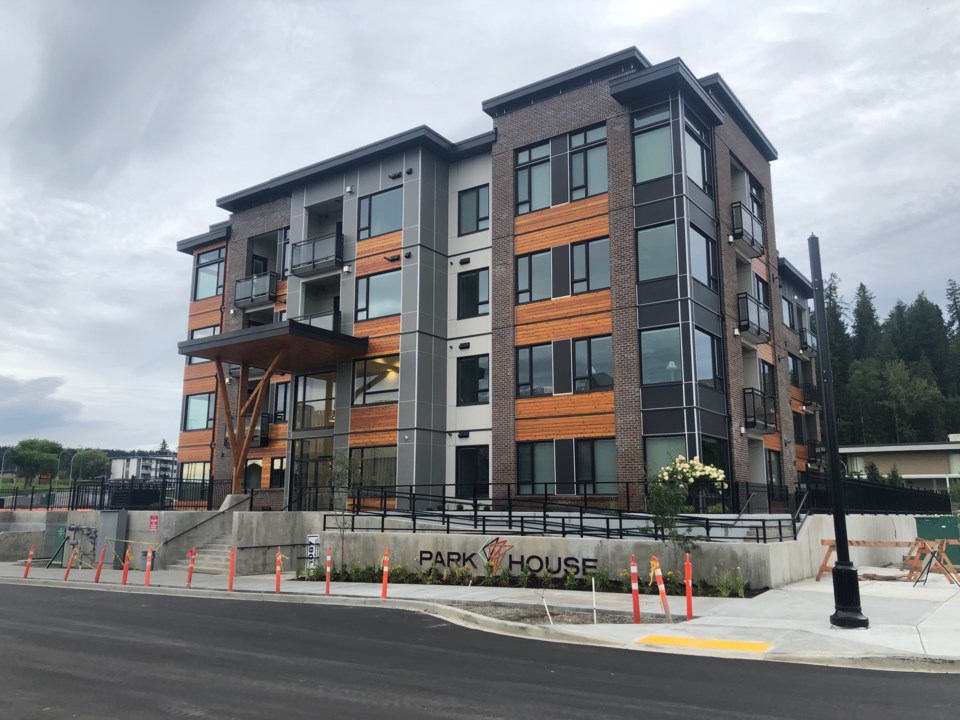The fallout from the George Street Parkade continues.
An examination of the downtown project's timeline of events has prompted Prince George city council to move discussions to closed meetings pending legal advice.
The parkade, which is also the foundation for the Park House Condominiums, is upwards of $9.8 million over budget for an estimated total of $22.5 million, not counting the additional cost of utility upgrades in the downtown which, added together, is around $34 million.
The issue raised by city council was the possible ‘intentional withholding of information’ by the former city manager Kathleen Soltis, who parted ways with the city in September 2020.
“Our city manager-of-the-day approved overages that were drastically over the scope of the project,” said Coun. Kyle Sampson when city council reviewed a second report further breaking down costs and timelines regarding the project at last night’s city council meeting (Jan. 11).
“I think it would be wrong of council not to completely acknowledge and really be disappointed in the fact that we had something like this go by us that was an intentional deceit on council.”
In 2017, the city agreed to partner with the developer to build the George Street Parkade intending to help attract housing and investment to advance downtown revitalization, with the original estimated cost being $12.6 million.
A previous report explains that in February 2018, due to engineering concerns regarding groundwater, the design for the parkade was changed to include a permanent dewatering system – which increased the project cost to $20 million.
It wasn’t until the March 11, 2019 meeting that council amended the Financial Plan to officially add the George Street Parkade Construction Project with an initial preliminary budget of the construction costs in the amount of $12,612,657.
“So after the fact, administration came to council knowing they already committed $20 million or more to a parkade and then came to council and said we need $12.5 million, that is all it’s going to cost?” asked Coun. Brian Skakun.
“The people in this community are outraged. I am outraged. When I look a this project, it just stinks in my opinion.”
In September 2019, the developer provided further updates on tender prices for mechanical, electrical fire suppression and membrane roofing materials which increased the cost to $22.5 million.
Another issue regarding the timeline of events was the city manager’s change in delegated authority – the power that allows them to approve cost overruns on capital projects without council approval.
Before May 2019, the city manager only had the authority to approve a cost overrun of $1 million per capital project without council approval, but Soltis requested a change in the delegated authority to five per cent of the total capital budget in a calendar year.
Technically, this change meant that five per cent of the city’s operating budget could be used on one project and high cost overruns could be approved without city council’s approval.
“With regards to the increase in delegated authority, that was not long after this, but was that meant to cover up the increased costs so that this would never come to light?” asked Coun. Terri McConnachie.
“It just smells bad that this overrun came up and then all of the sudden ‘Hey, let’s increase the delegated authority to the city manager,’ and we can just carry on down the street.”
Kris Dalio, the city’s director of finance, said the initial change in delegated authority was done with the intent to cap the amount of spending as there was no limit on the number of capital projects which could be approved for a $1 million overage in a calendar year.
“But you are right, it allowed the ability for it to all be used for one project instead of $1 million per project,” answered Dalio.
Coun. Sampson had further questions regarding the change in delegated authority related to this project, stating the city manager knew about the $20 million price tag in 2018 but did not have the authority to approve it until May 2019.
Sampson said the city manager told council the change in delegated authority would provide greater oversight, but instead gave the opportunity to officially approve the project.
“I guess that in itself, there is a million things about this that are unbelievable, but that in itself absolutely proves to me that council was intentionally deceived by one member of staff and that is unacceptable,” said Sampson.
“I would like to refer this to come back in a closed meeting because I think we have a further conversation here that might involve a legal opinion.”
While council changed its financial guidelines to limit delegated to five per cent of the capital project budget or $100,000 in November 2020 to curb this problem, Coun. Cori Ramsay made the motion to receive a report showing the city manager’s use of delegated authority for all of 2020.
Her motion also included the request to have a report on delegated authority come to council quarterly, moving forward.
“This is in my comfort level and I’m curious to see what is going to come out of the woodwork on the city manager’s previous delegated authority and I want a heads up,” said Ramsay, who’s motion was approved unanimously.
Towards the end of the discussion, Coun. Skakun also assured that despite the conversation moving to closed meetings, this would not be the end of the public scrutiny.
“It is not going into some closed graveyard where we never hear about it again,” he said.



